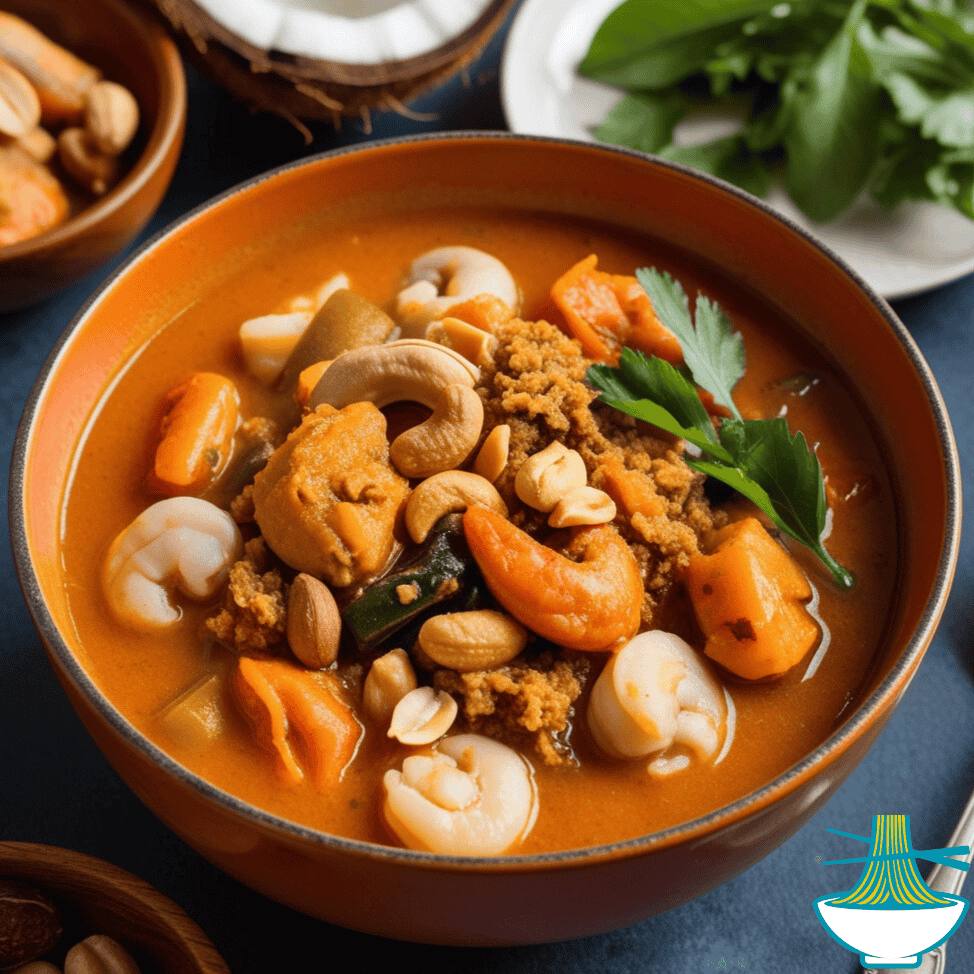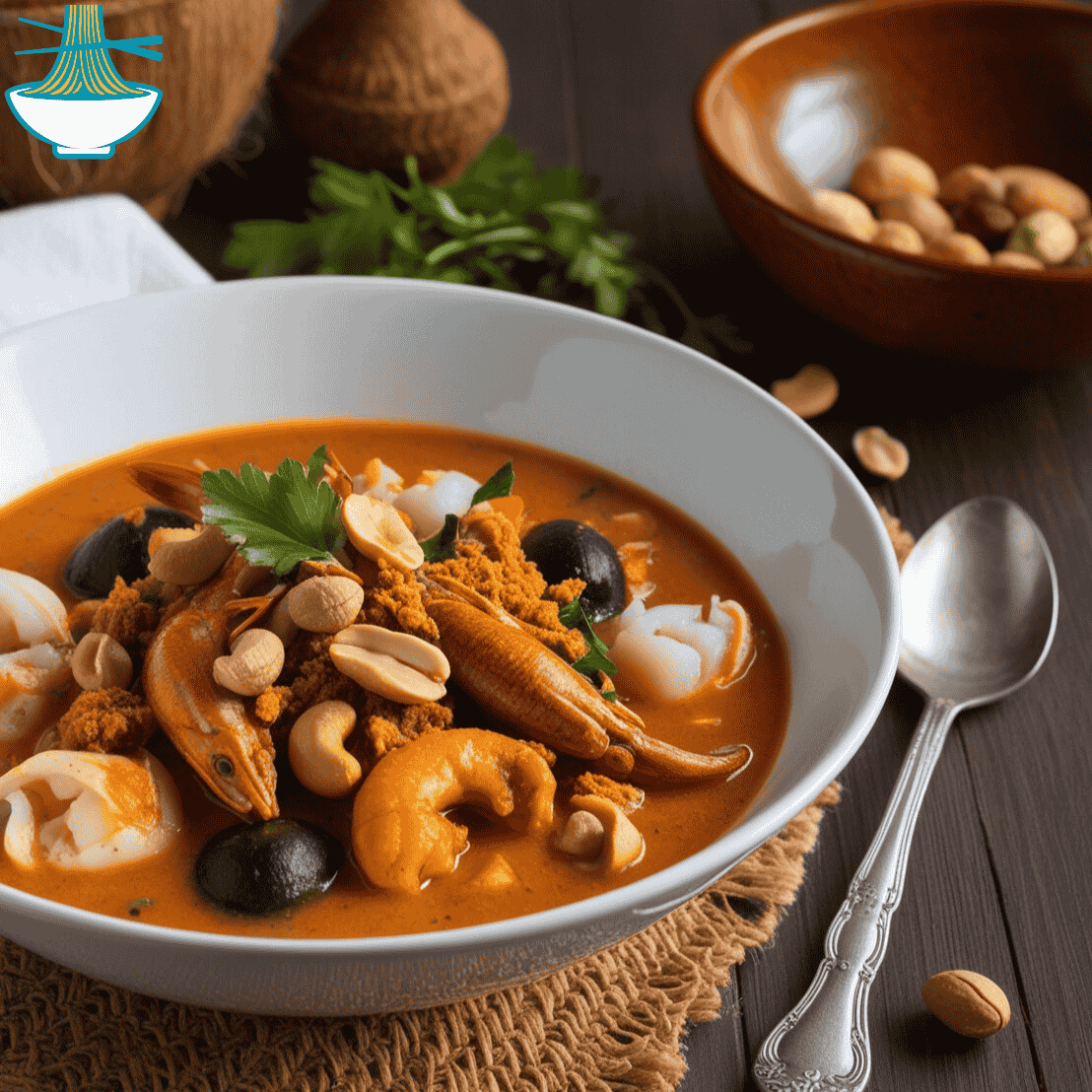Vatapá is a quintessential Brazilian seafood stew originating from the vibrant northeastern state of Bahia. This dish harmoniously blends creamy coconut milk with ground cashews, peanuts, and dendê oil (red palm oil), resulting in a rich and flavorful stew with a distinctive orange hue. Vatapá is a true reflection of Brazil’s diverse culinary heritage, incorporating African, indigenous, and Portuguese influences, particularly evident in ingredients like dendê oil and ground nuts.

Born from the fusion of African culinary traditions brought by enslaved Africans to Brazil, Vatapá has evolved into a beloved Bahian staple. It is a festive favorite often served with rice or acarajé (deep-fried black-eyed pea fritters) during special celebrations and family gatherings. This unique dish is cherished for its bold flavors and cultural significance, making it an integral part of Brazilian cuisine.
Ingredients:
1. 1 pound fish fillets (cod, haddock, or similar)
2. 1 pound shrimp, peeled and deveined
3. 1 onion, chopped
4. 2 cloves garlic, minced
5. 2 tablespoons olive oil
6. 1 can (13.5 oz) coconut milk
7. 1/2 cup cashews, chopped
8. 1/2 cup peanuts, chopped
9. 1/2 cup bread crumbs
10. 2 tablespoons dendê oil (palm oil)
11. 1 tablespoon tomato paste
12. 1 tablespoon fresh ginger, minced
13. 1 tablespoon fresh cilantro, chopped
14. 1 tablespoon fresh parsley, chopped
15. 1 teaspoon ground cumin
16. 1 teaspoon ground coriander
17. 1 teaspoon paprika
18. Salt and pepper to taste
Method:
1. Prepare Fish: Cut fish fillets into small pieces, season with salt and pepper.
2. Cook Fish: Heat olive oil in a large skillet over medium heat. Add onion and garlic, sauté until translucent. Add fish and cook until lightly browned, about 5-7 minutes. Remove fish and set aside.
3. Cook Shrimp: In the same skillet, add shrimp and cook until pink and cooked through, about 3-5 minutes. Remove shrimp and set aside.
4. Prepare Nut Mixture: In a food processor, combine cashews, peanuts, and bread crumbs. Pulse until finely ground.
5. Make Sauce: In the same skillet, heat dendê oil over medium heat. Add tomato paste, cumin, coriander, and paprika. Stir to combine. Add coconut milk and bring to a simmer.
6. Combine Ingredients: Stir in the ground cashew mixture and cook until the sauce thickens. Add cooked fish and shrimp, along with ginger, cilantro, and parsley. Stir until everything is heated through.
7. Serve: Enjoy Vatapá hot with rice or bread.
Notes:
- Dendê Oil: This distinctive ingredient adds both flavor and color. It is integral to many Brazilian dishes.
- Variations: Feel free to use other seafood like crab or lobster. Adjust spice levels by adding chilies or hot sauce if desired.

Nutrition Value:
1. 1 pound fish fillets (cod, haddock, or similar)
- Calories: 200-250
- Carbohydrates: 0 g
- Protein: 40-50 g
- Fat: 2-5 g
- Sodium: 60-80 mg
- Cholesterol: 70-90 mg
- Vitamins: High in B vitamins, particularly B12
- Minerals: Good source of iodine, phosphorus, and selenium
- Nutritional Benefit: Provides lean protein, supports muscle growth, and is rich in essential nutrients for overall health.
2. 1 pound shrimp, peeled and deveined
- Calories: 120-140
- Carbohydrates: 1-2 g
- Protein: 24-30 g
- Fat: 1-2 g
- Sodium: 300-400 mg
- Cholesterol: 170-200 mg
- Vitamins: High in vitamin B12 and vitamin D
- Minerals: Rich in iodine, phosphorus, and selenium
- Nutritional Benefit: Low in fat and high in protein, supports muscle development and provides important vitamins and minerals.
3. 1 onion, chopped
- Calories: 45
- Carbohydrates: 11 g
- Protein: 1 g
- Fat: 0 g
- Sodium: 5 mg
- Cholesterol: 0 mg
- Vitamins: Rich in vitamin C
- Minerals: Contains potassium and manganese
- Nutritional Benefit: Adds flavor and antioxidants, supports immune health and digestion.
4. 2 cloves garlic, minced
- Calories: 8
- Carbohydrates: 2 g
- Protein: 0 g
- Fat: 0 g
- Sodium: 1 mg
- Cholesterol: 0 mg
- Vitamins: Contains vitamin C and B vitamins
- Minerals: Provides manganese and calcium
- Nutritional Benefit: Boosts immune function, has anti-inflammatory properties, and enhances flavor.
5. 2 tablespoons olive oil
- Calories: 240
- Carbohydrates: 0 g
- Protein: 0 g
- Fat: 27 g
- Sodium: 0 mg
- Cholesterol: 0 mg
- Vitamins: Contains vitamin E and K
- Minerals: Provides some calcium and potassium
- Nutritional Benefit: Rich in monounsaturated fats, supports heart health and provides antioxidants.
6. 1 can (13.5 oz) coconut milk
- Calories: 445
- Carbohydrates: 6 g
- Protein: 4 g
- Fat: 48 g
- Sodium: 45 mg
- Cholesterol: 0 mg
- Vitamins: Contains small amounts of vitamin C and B vitamins
- Minerals: High in manganese, magnesium, and potassium
- Nutritional Benefit: Adds creamy texture and healthy fats, supports digestion and heart health.
7. 1/2 cup cashews, chopped
- Calories: 400
- Carbohydrates: 24 g
- Protein: 10 g
- Fat: 32 g
- Sodium: 0 mg
- Cholesterol: 0 mg
- Vitamins: Rich in vitamin E and K
- Minerals: High in magnesium, phosphorus, and zinc
- Nutritional Benefit: Provides healthy fats and protein, supports bone health and boosts energy.
8. 1/2 cup peanuts, chopped
- Calories: 400
- Carbohydrates: 14 g
- Protein: 17 g
- Fat: 34 g
- Sodium: 0 mg
- Cholesterol: 0 mg
- Vitamins: Contains vitamin E and B vitamins
- Minerals: Good source of magnesium, phosphorus, and potassium
- Nutritional Benefit: Provides protein and healthy fats, supports heart health and energy levels.
9. 1/2 cup bread crumbs
- Calories: 200
- Carbohydrates: 36 g
- Protein: 6 g
- Fat: 2 g
- Sodium: 300 mg
- Cholesterol: 0 mg
- Vitamins: Provides some B vitamins
- Minerals: Contains small amounts of iron and calcium
- Nutritional Benefit: Adds texture and helps bind ingredients, provides carbohydrates for energy.
10. 2 tablespoons dendê oil (palm oil)
- Calories: 240
- Carbohydrates: 0 g
- Protein: 0 g
- Fat: 28 g
- Sodium: 0 mg
- Cholesterol: 0 mg
- Vitamins: Contains vitamin E
- Minerals: Provides small amounts of calcium and magnesium
- Nutritional Benefit: Adds a unique flavor and color, provides healthy fats.
11. 1 tablespoon tomato paste
- Calories: 13
- Carbohydrates: 3 g
- Protein: 0 g
- Fat: 0 g
- Sodium: 125 mg
- Cholesterol: 0 mg
- Vitamins: Contains vitamin C and A
- Minerals: Provides potassium and iron
- Nutritional Benefit: Adds rich tomato flavor and antioxidants, supports immune health.
12. 1 tablespoon fresh ginger, minced
- Calories: 5
- Carbohydrates: 1 g
- Protein: 0 g
- Fat: 0 g
- Sodium: 0 mg
- Cholesterol: 0 mg
- Vitamins: Contains vitamin C
- Minerals: Provides manganese and magnesium
- Nutritional Benefit: Adds flavor, has anti-inflammatory properties, and aids digestion.
13. 1 tablespoon fresh cilantro, chopped
- Calories: 1
- Carbohydrates: 0 g
- Protein: 0 g
- Fat: 0 g
- Sodium: 1 mg
- Cholesterol: 0 mg
- Vitamins: Rich in vitamins A and C
- Minerals: Contains potassium and calcium
- Nutritional Benefit: Adds fresh flavor and nutrients, supports digestion and immune function.
14. 1 tablespoon fresh parsley, chopped
- Calories: 1
- Carbohydrates: 0 g
- Protein: 0 g
- Fat: 0 g
- Sodium: 1 mg
- Cholesterol: 0 mg
- Vitamins: Rich in vitamins A, C, and K
- Minerals: Provides iron and calcium
- Nutritional Benefit: Enhances flavor, supports bone health and immune system.
15. 1 teaspoon ground cumin
- Calories: 8
- Carbohydrates: 1 g
- Protein: 0 g
- Fat: 0 g
- Sodium: 1 mg
- Cholesterol: 0 mg
- Vitamins: Contains small amounts of vitamin B6
- Minerals: Provides iron and calcium
- Nutritional Benefit: Adds flavor and aids digestion, supports iron intake.
16. 1 teaspoon ground coriander
- Calories: 5
- Carbohydrates: 1 g
- Protein: 0 g
- Fat: 0 g
- Sodium: 1 mg
- Cholesterol: 0 mg
- Vitamins: Contains vitamin C
- Minerals: Provides iron and calcium
- Nutritional Benefit: Adds flavor, has anti-inflammatory properties, supports immune health.
17. 1 teaspoon paprika
- Calories: 6
- Carbohydrates: 1 g
- Protein: 0 g
- Fat: 0 g
- Sodium: 1 mg
- Cholesterol: 0 mg
- Vitamins: Contains vitamin A and E
- Minerals: Provides iron and potassium
- Nutritional Benefit: Adds color and flavor, supports vision and immune health.
18. Salt and pepper to taste
- Salt:
- Calories: 0
- Carbohydrates: 0 g
- Protein: 0 g
- Fat: 0 g
- Sodium: 2300 mg (per teaspoon)
- Cholesterol: 0 mg
- Vitamins: None
- Minerals: High in sodium
- Nutritional Benefit: Enhances flavor; excessive use should be avoided to manage sodium intake.
- Pepper:
- Calories: 6 (per teaspoon)
- Carbohydrates: 1 g
- Protein: 0 g
- Fat: 0 g
- Sodium: 1 mg
- Cholesterol: 0 mg
- Vitamins: Contains vitamin K and small amounts of vitamin C
- Minerals: Provides iron and manganese
- Nutritional Benefit: Adds flavor and has antioxidant properties.


Comments